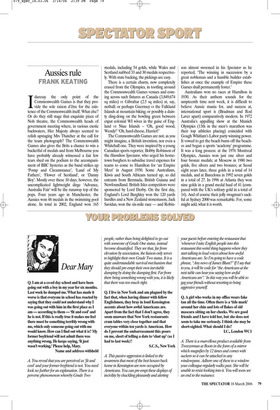Aussies rule
FRANK KEATING
Idaresay the only point of the Commonwealth Games is that they provide the sole raison d’être for the existence of the Commonwealth itself. What else? Or do they still stage that exquisite piece of Noh theatre, the Commonwealth heads of government meeting where, in various exotic backwaters, Her Majesty always seemed to relish upstaging Mrs Thatcher at the call for the team photograph? The Commonwealth Games also gives the Brits a chance to win a bucketful of medals and from Melbourne you have probably already witnessed a fair few tears shed on the podium to the accompaniment of BBC hysterics as the band strikes up ‘Pomp and Circumstance’, ‘Land of My Fathers’, ‘Flower of Scotland’, or ‘Danny Boy’. Mostly over these 10 days, however, the uncomplicated lightweight dirge ‘Advance, Australia Fair’ will be the runaway top of the pops. Four years ago in Manchester, the Aussies won 48 medals in the swimming pool alone. In total in 2002, England won 165 medals, including 54 golds, while Wales and Scotland nabbed 33 and 30 medals respectively. With state backing, the pickings are easy.
There is a certain charm, now completely erased from the Olympics, in tootling around the Commonwealth Games venues and coming across such fixtures as Canada (3,849,674 sq miles) vs Gibraltar (2.5 sq miles) at, say, netball; or perhaps Guernsey vs the Falkland Islands at mountain biking; or possibly a dainty ding-dong on the bowling green between expat colonial WI wives in the guise of England vs Niue Islands – ‘Oh, good wood, Wendy!’ ‘Oh, hard cheese, Harriet!’ The Commonwealth Games are not, as you might imagine, a British invention, nor even a Whitehall one. They were inspired by a young Canadian sports reporter, Bobby Robinson of the Hamilton Spectator, who urged his hometown burghers to subsidise travel expenses for teams to come to Hamilton for ‘an Empire Meet’ in August 1930. Some Australians, Kiwis and South Africans turned up, so did entrants from Bermuda, British Guiana and Newfoundland. British Isles competitors were sponsored by Lord Derby. On the first day, England’s Lord Burghley won the 120 yards hurdles and a New Zealand stonemason, Jack Savidan, won the six-mile race — and Robin son almost swooned in his Spectator as he reported, ‘The winning in succession by a great nobleman and a humble builder establishes at once the example of Empire these Games shall permanently foster.’ Australians won no races at Hamilton in 1930. As their anthem sounds for the umpteenth time next week, it is difficult to believe Aussie mania for, and success at, international sport is (Bradman and Rod Laver apart) comparatively modern. In 1972 Australia’s appalling show at the Munich Olympics (13th in the men’s marathon was their top athletics placing) coincided with Gough Whitlam’s Labor party winning power. It vowed to get the beach bums off the beaches and began a sports ‘academy’ programme. It was a long process: at the 1976 Montreal Olympics, Aussies won just one silver and four bronze medals; at Moscow in 1980 two golds, five silvers and two bronzes; at Seoul eight years later, three golds in a total of 14 medals, and at Barcelona in 1992 seven golds in a total of 27. In 1996 at Atlanta they won nine golds in a grand medal haul of 41 (compared with the UK’s solitary gold in a total of 14). And of course their jolly swagman’s sackful at Sydney 2000 was remarkable. For, some might add, what it is worth.


















































































 Previous page
Previous page